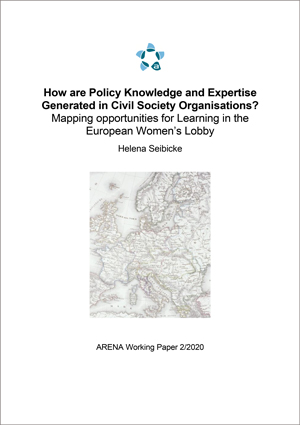 In this paper, I map the opportunities for intra-organizational learning in the European Women’s Lobby (EWL) and argue that these processes generate the expertise and specialised knowledge required by EU governance. I show that the EWL’s learning processes do not just result in the formation of expertise, but have also led to institutional transfer. Overall, the EWL has aims to create a culture of mutual learning and knowledge sharing in order to fulfil the EU’s demand for policy expertise. However, the requirement for expertise is not just imposed from the top onto the EWL, but is in fact created actively as an important organisational resource. This is significant because the potential ‘permanent tension’ for civil society organisations (CSOs) to be both expertise provider in EU governance, while at the same time acting as intermediaries between the institutions and its member organisations is not as pronounced as expected. Intra-organizational learning is strategically chosen. Contrary to most scholarship, which either analyses the role of expertise in EU policy-making, or the role of CSOs for legitimising EU legislative processes, the article takes a novel approach in demonstrating that for EU CSOs, the functions of expertise providers and representatives of civil society are interwoven.
In this paper, I map the opportunities for intra-organizational learning in the European Women’s Lobby (EWL) and argue that these processes generate the expertise and specialised knowledge required by EU governance. I show that the EWL’s learning processes do not just result in the formation of expertise, but have also led to institutional transfer. Overall, the EWL has aims to create a culture of mutual learning and knowledge sharing in order to fulfil the EU’s demand for policy expertise. However, the requirement for expertise is not just imposed from the top onto the EWL, but is in fact created actively as an important organisational resource. This is significant because the potential ‘permanent tension’ for civil society organisations (CSOs) to be both expertise provider in EU governance, while at the same time acting as intermediaries between the institutions and its member organisations is not as pronounced as expected. Intra-organizational learning is strategically chosen. Contrary to most scholarship, which either analyses the role of expertise in EU policy-making, or the role of CSOs for legitimising EU legislative processes, the article takes a novel approach in demonstrating that for EU CSOs, the functions of expertise providers and representatives of civil society are interwoven.
How are Policy Knowledge and Expertise Generated in Civil Society Organisations? Mapping Opportunities for Learning in the European Women’s Lobby
ARENA Working Paper 2/2020 (pdf)
Helena Seibicke
Published June 11, 2020 4:06 PM
- Last modified Mar. 2, 2021 11:12 AM